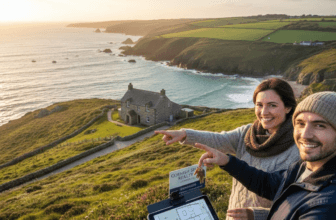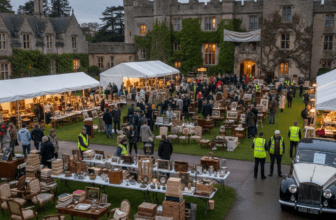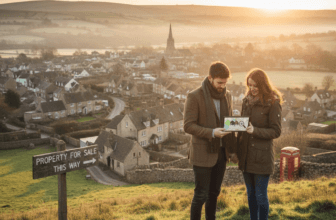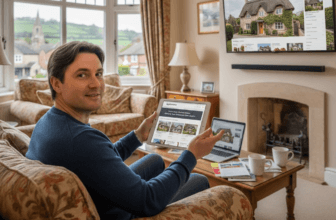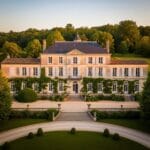
Your Fairytale Awaits: The Ultimate UK Guide to Buying a Chateau in France
For many of us in the United Kingdom, the dream of owning a property in France is a familiar and cherished daydream. It often involves a sun-drenched terrace, a glass of local wine, and the gentle hum of cicadas. But for the truly adventurous, the dream is bigger. It’s a dream of soaring turrets, ancient stone walls, and a history that seeps from the very foundations. It’s the dream of owning a French chateau.
The allure is undeniable. To be the custodian of a piece of French history, to wake up in a room that might have once hosted nobility, and to have acres of private parkland to call your own is a fantasy of the highest order. And, surprisingly, it’s a dream that is more attainable than many believe. While a chateau might sound like the exclusive preserve of millionaires, the reality of the French property market is far more nuanced. From sprawling Loire Valley palaces to more modest manor houses in the Dordogne, there is a vast spectrum of properties that fall under the romantic umbrella of ‘chateau’.
This guide is for the UK dreamer who is ready to take the next step. We’ll delve into the practicalities, navigate the legalities, and explore the breathtaking regions where your very own fairytale castle might be waiting. Forget the fleeting fantasy; it’s time to get serious about buying a chateau in France.
What is a Chateau, Really? Demystifying the Dream

The first thing to understand is that the word ‘chateau’ doesn’t always translate to a gargantuan castle with a moat and drawbridge (though those do exist!). The term is used more broadly in France than we might expect. It can refer to a grand country house, a historic manor, a wine-producing estate, or, yes, a fortified medieval castle. This is fantastic news for potential buyers, as it widens the scope of available properties considerably.
- Fortified Castles (Château Fort): These are the oldest and most historic properties, often dating back to the medieval period. They come with thick stone walls, towers, and a powerful sense of history. They also come with significant challenges, often requiring extensive, specialist renovation and adherence to strict historical monument regulations.
Finding Your Kingdom: Where to Buy a Chateau in France
France is a vast and varied country, and the character of its chateaux changes dramatically from one region to another. For UK buyers, proximity and accessibility are often as important as the property itself.
The Loire Valley: The Garden of France
When you close your eyes and picture a French chateau, you’re probably picturing the Loire Valley. This region is world-famous for its magnificent, elegant chateaux like Chambord and Chenonceau. The properties here are often grand, set in manicured parkland, and steeped in royal history. It’s a prime location, easily accessible from Paris and with excellent transport links, making it a popular choice for those looking to run a high-end events venue or hotel. Prices here reflect the prestige, but the reward is a truly iconic slice of French heritage.
Dordogne & Nouvelle-Aquitaine: The British Favourite
For decades, this region in the South West has been the heartland for British expats, and for good reason. The landscape is a stunning tapestry of rolling hills, meandering rivers, and picturesque medieval villages. The chateaux here are often more rustic and romantic, built from warm, honey-coloured stone. You’ll find a huge variety of properties, from dramatic clifftop fortresses to charming manoirs perfect for a B&B. The strong British community can be a real bonus, offering a network of support and advice. The climate is milder, the food is exceptional (think truffles, foie gras, and confit de canard), and the pace of life is wonderfully slow.
Normandy & Brittany: Close to Home
For those who value quick and easy trips back to the UK, Normandy and Brittany are ideal. Just a short hop across the Channel, these regions offer a rugged, dramatic coastline and a lush, green interior reminiscent of the British countryside. The chateaux here often have a more robust, fortified feel, with strong historical ties to the UK. Properties can be more affordable than in the south, offering fantastic value. You might find a granite manoir near the Pink Granite Coast of Brittany or a half-timbered chateau nestled in the apple orchards of Normandy, famous for its cider and Calvados.
Provence & the Côte d’Azur: Sun-Drenched Luxury
If your dream involves lavender fields, olive groves, and endless sunshine, then Provence is your destination. This is the glamorous, high-end of the French property market. Chateaux here, often called ‘bastides’ or ‘domaines’, are typically elegant country estates, often surrounded by vineyards or fragrant gardens. Life here is lived outdoors, and properties are designed to maximise the connection to the stunning landscape. The price tag is significantly higher, but for those with the budget, it offers an unparalleled lifestyle of sophistication and Mediterranean charm.
The Practical Path to Purchase: A UK Buyer’s Guide
Falling in love with a chateau is the easy part. The buying process in France is different from the UK system, and it’s crucial to understand the steps involved.
Step 1: The Budget – Be Brutally Realistic
Your budget isn’t just the asking price. You must factor in a host of other expenses.
- The Purchase Price: The headline figure.
- Notaire’s Fees (Frais de Notaire): The notaire is a neutral public official who handles the legalities of the sale. Their fees are set by the government and typically amount to 7-8% of the purchase price.
- Estate Agent’s Fees (Frais d’Agence): These are usually included in the advertised price (‘frais d’agence inclus’ or FAI), but always clarify.
- The Renovation Fund: This is the big one. Unless you are buying a fully restored property, you will need a substantial budget for renovations. Old buildings hide expensive secrets. Get a full structural survey (‘expertise’) done by a qualified professional before you commit.
- Ongoing Costs: Consider property taxes (‘taxe foncière’ and ‘taxe d’habitation’), insurance, and the immense cost of utilities. Heating a 30-room chateau with single-glazed windows through a French winter is no small expense.
Step 2: The Legal Dance – From Offer to Ownership
Once you’ve found your dream property and agreed on a price, the legal process begins.
- The Offer (Offre d’Achat): A formal written offer to purchase. Once accepted and signed by both parties, it can be legally binding.
The Reality of Your Reign: Life After the Purchase
Owning a chateau is not a passive investment; it’s a lifestyle, a project, and often, a full-time job. The romance of wandering through your own historic halls is wonderful, but it comes with a deep sense of responsibility.
Navigating French Bureaucracy
Any work you plan to do, especially on a property of historical significance, will require navigating French bureaucracy. For minor changes, a ‘déclaration préalable de travaux’ might suffice. For major renovations or extensions, a ‘permis de construire’ (planning permission) is essential. If your chateau is listed as a ‘monument historique’ or is located in a protected area, you will also have to consult with the ‘Architecte des Bâtiments de France’ (ABF). This official’s role is to protect France’s architectural heritage, and they have the final say on what you can and cannot do to the property’s exterior. Working with them, rather than against them, is key.
Turning Your Castle into Cash
Many chateau owners need to make their properties pay for themselves. The potential is enormous, but it requires a business mindset.
- Boutique Hotel or Chambres d’Hôtes: The classic option. Offering a handful of beautifully decorated suites can provide a steady income.
Is a French Chateau Really for You?
Before you take the plunge, you must ask yourself some honest questions. Are you looking for a quiet life, or are you ready for the project of a lifetime? Are you a hands-on person who relishes a challenge, or do you have the funds to hire a team of project managers, builders, and gardeners? Do you speak French, or are you willing to learn? Integrating into the local community is a vital part of the experience. Owning a chateau requires passion, patience, deep pockets, and a good sense of humour. It is a marathon, not a sprint.
For the right person, however, there is no greater reward. It is a chance to live in a work of art, to be a guardian of history, and to create a legacy for future generations. The journey from UK dreamer to French châtelain is a long and challenging one, but for those who succeed, the fairytale is very, very real.



